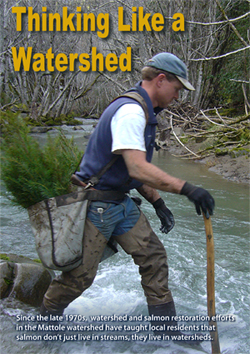ADDITIONAL QUESTIONS
WHY DID THE MRC MAP THE WHOLE REGION?
In order to learn about their watershed and learn where the forests had been cut, where fish still survive, and where habitats need to be repaired.
How does restoration relate to the economy of ther Mattole River Valley?
How are the Mattole people “lkeeping the wealth in the community?”
What are the separate roles that people play in the restoration project?
Can you name the different types of work involved in ecological restoration?
Fisheries biologists, hatchbox workers, geologists, tree planters, loggers, foresters, road removers, road maintainers, divers, outreach workers, educators, fundraisers, heavy eqiuipment operators, field surveyors, wildlife biologists, office organizers, program directors, active boardmembers, mapping technicians, and more.
What are old-growth, second growth, and new-growth forests?
How are they different in complexity, flora, and fauna?
What happens to an area after it’s clear-cut?
What happens to the animals of that region?
What does road building do to the surrounding forest?
What is required to restore a damaged watershed?
What role can young people play in restoring an ecosystem?
How can young people learn about the ecosystem they live in?
What is bioregionalism?
[Note: even though bioregionalism is not discussed in the video, it is a concept and movement that many of the Mattole residents believe in and support.]
“Bioregionalism upholds the hope of learning to live more lightly on the Earth, of developing communities integrated with their local ecosystems – creaturely associations that can carry the lifesome ethic forward through the generations.”
Stephanie Mills, Home! A Bioregional Reader.
"Bioregionalism is a decentralized, self-determined mode of social organization, a culture predicated on biological integrity and acting in respectful accord, and a society which honors and abets the spiritual development of its members… Bioregionalism holds that the health of natural systems is directly connected to our own physical/psychic health as individuals and as a species and for that reason, natural systems and their informing integrations deserve, if not utter veneration, at least our clearest attention and respect."
Jim Dodge, writing in the CoEvolution Quarterly, Winter 1981
|
